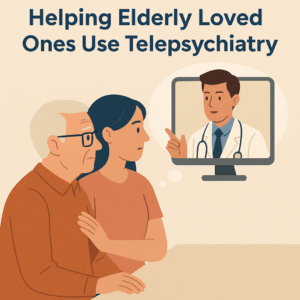🧓 Helping Elderly Loved Ones Use Telepsychiatry
 By Dr. Srinivas Rajkumar T, Consultant Psychiatrist
By Dr. Srinivas Rajkumar T, Consultant Psychiatrist
💬 “My father forgets things—can we do a memory check online?”
📞 “My mother is too weak for a hospital visit—can we talk to a doctor by phone?”
🧓 “How do we involve family members if the patient is hard of hearing?”
These are real, important questions I hear every week from adult children, caregivers, and senior citizens.
The good news is: Telepsychiatry for the elderly works—and it can be life-changing.
With the right approach, older adults can receive mental health care from the comfort of home, with family support, and full confidentiality.
🧠 Common Mental Health Concerns in Older Adults
-
Memory loss or dementia
-
Depression and loneliness
-
Sleep issues
-
Anxiety about health
-
Medication-related confusion
-
Delirium after hospitalisation
-
Grief and caregiver stress
These concerns are often under-reported and under-treated—but very manageable with the right care.
📲 How Telepsychiatry Helps Older Adults
-
🏠 No travel required – ideal for frail or mobility-limited seniors
-
🧑⚕️ Private and non-threatening – especially for those hesitant to visit a hospital
-
👪 Caregiver can join in – allows collaborative discussions
-
🕒 Short, flexible sessions – suited for attention span and energy levels
🧪 Memory and Dementia Screening – Done Online
We use standard tools like:
-
MoCA (Montreal Cognitive Assessment)
-
MMSE (Mini-Mental State Examination)
-
Simple tasks involving language, memory, drawing, orientation
💡 Caregivers can help with screen positioning or responses if needed.
This helps detect early signs of Alzheimer’s, vascular dementia, or reversible cognitive decline (e.g. B12 deficiency, depression).
👨👩👧 Involving the Caregiver – A Team Approach
In many cases, especially with dementia, the patient may:
-
Deny memory loss
-
Have trouble understanding instructions
-
Feel confused during a call
That’s why I encourage caregivers to:
-
Be present during the call
-
Help describe real-life examples (forgetting, repeating, getting lost)
-
Monitor medications and report any side effects or sedation
-
Assist in making lifestyle changes at home
📝 We often create a shared care plan—so everyone is aligned.
💊 Assessing Medication and Sleep in Older Adults
Older patients are often on multiple medications—and may experience:
-
Confusion or imbalance
-
Over-sedation
-
Drug interactions (e.g. psychiatric + diabetic medications)
Through teleconsultation, I:
-
Review each medicine
-
Adjust psychiatric drugs to safer alternatives
-
Minimize “pill burden”
-
Address sleep issues without dependency (e.g. melatonin, trazodone over benzodiazepines)
🛌 Better sleep improves memory, mood, and daily functioning.
📞 No Video? No Problem.
Some elderly patients may:
-
Not be comfortable with video calls
-
Have vision, hearing, or tech barriers
In such cases, I conduct audio-only consultations, provided:
-
A family member joins to help with history
-
Follow-up is consistent
-
Any visual aids (lab reports, medication list) are shared via WhatsApp or email
📄 We can even share printed prescriptions or reports for home nurses or primary doctors to follow.
👨⚕️ My Approach to Elderly Mental Health Care
As a Consultant Psychiatrist working closely with elderly patients and caregivers, I focus on:
-
Early detection of dementia or depression
-
Safe medication management
-
Family-centered care plans
-
Online or home-based support when travel isn’t feasible
📞 To book a teleconsultation for your elderly loved one: Call 8595155808
📍 I consult via video or phone – Tamil/English/Hindi
🕘 Morning and evening slots available
🧾 Final Thoughts
Mental health care for older adults doesn’t have to be hospital-based.
With telepsychiatry, you can bring compassionate, expert support right into your loved one’s home.
Start with a conversation. Stay consistent.
Because dignity, clarity, and comfort should not be age-limited.